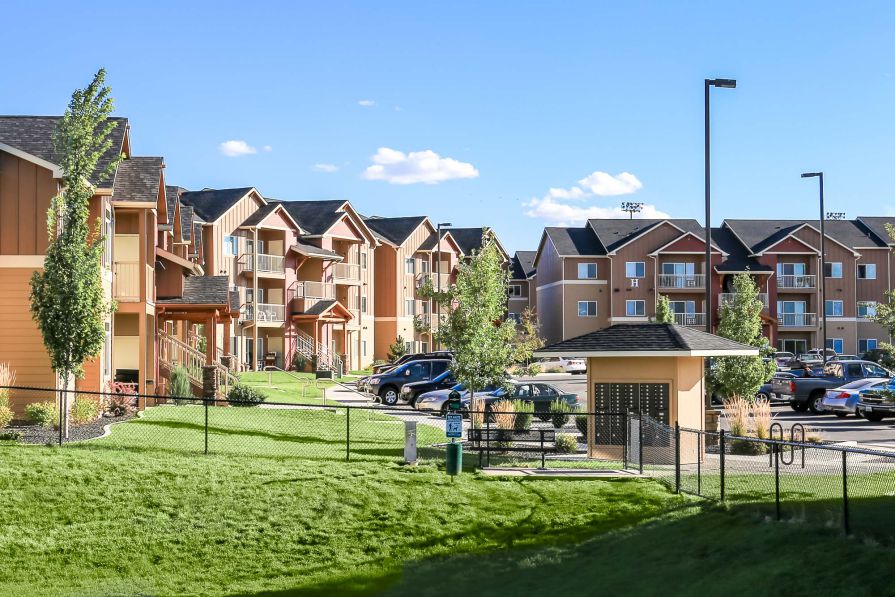So you really want to grow? Since we started in REI, many have said “go big or go home”. But how?
Investing in real estate is very exciting and a great way to build wealth when deals are available and offers are being made. But on the flip side, it can be daunting and frustrating when the deal flow slows to a trickle and there’s nothing to buy. Today, in a market where many investors are competing for a limited supply of buildings, it can be difficult for full time investors and their firms to reach growth goals.
The team at Akras realized early on that if we wanted to buy several hundred units in our Spokane market, we could either do it slowly and painfully, buying a 4 unit here, a 6 unit there, closing dozens of deals until we had reached our 2019 goal of 100 apartments (if we reached it at all). Or we could do it efficiently by buying two or three larger buildings, each with 20-50 units. This is where we are now focused.
But what if you could reach your yearly goal with one single deal, buying a complex of 100-250 units? Done, in one fell swoop. Sounds pretty good right?

This type of deal launches you into a new level of REI and can quickly and efficiently generate wealth, if you do it right. It can destroy your investment business if you don’t. Besides that, it’s highly unlikely most investors will ever be offered these kinds of deals unless they have the right network, partners and track record established. Last and certainly not least, it can require a whole bunch of money to buy an apartment complex or large building, requiring a small army of investors and lenders. So how do you do it?
Introducing: Deal Syndication
Realizing that this kind of a deal and focus would require a whole new set of skills and contacts, the Akras team went to work to strengthen our business to conduct what is commonly known in the real estate investment industry as “syndication”.
Real estate syndication is simply defined as pooling the funds and expertise of a group of investors and channeling these resources to purchase large real estate properties. These funds can be used to acquire a property in its entirety, or can be used as an equity contribution to the project in addition to a commercial mortgage from a bank, which would fund the majority of the project’s costs.

Here are a few more specifics that help to illustrate syndication as a strategy for REI:
- Large Deals. Deals are larger, ranging from 100 to 500 units and involve apartment complexes and large apartment buildings. Often the deals are based on repurposing/repositioning existing older buildings and complexes. Syndication is also used to develop and build brand-new apartment complexes.
- Different Property Types. Some deals feature mixed-use properties that have retail components and depending on the residential “Class”, amenities like pools and other recreational facilities.
- Fixed Investor Structure. Investors are broken into two groups: the “Deal Sponsors” and the “Limited Partners”.
- Deal Sponsors are a smaller group of usually 2-5 active partners who find the property, underwrite it and raise money from a larger pool of investors. They are also responsible for hiring the management company and any contractors necessary to manage and fix up the properties.
- General Partner is the term for the lead deal sponsor, who is the most experienced partner, leading the charge and ultimately responsible for its success.
- Limited Partners are the larger pool of passive investors who are key to supplying the bulk of the capital needed to close the deal. They usually have no role other than providing capital.
- Passive Investment. Most Investors participate passively and receive a preferred return and a share of profits. This means a passive investor will receive their stated share of profits/cash flow before any returns are paid to the deal sponsors/managers.

Kendall Yards in Spokane is an example of a more recent syndicated development deal
Some of the pros to this type of strategy include that you get to work with experienced teams, there is no need to invest significant time or energy, the investors receive a preferred return and the potential return to investors and upside can be great if reality exceeds returns assumptions. The Deal Sponsors perform the strictest due diligence on these types of deals. This includes gaining deep market knowledge, understanding risk parameters and developing return assumptions, and communicating them transparently to potential investors.
As An Independent Investor, Why Should You Consider Syndication Deals?

Syndicated deals are a great way to invest, but are definitely not for everyone. So how would you know if participating as a passive investor in a syndication deal is right for you?
Syndication deals are great for investors who want to get into real estate investing and have some or all of the following characteristics:
- Time Constraints. No time to actively invest in real estate because of high time commitments with their primary job or family
- Want Passive Involvement. No interest in having responsibilities managing the asset, wanting to avoid any additional work.
- Priced Out. Your local real estate market has become too expensive to invest in.
- No Team. You don’t have partners or other resources to invest long distance, out of your local market.
- Inexperienced. You are uncomfortable with real estate investing, or simply lack experience but want to learn.
How do you do it? It’s All About Your Partners and Network (Again)

Ultimately, syndicating a deal, and acquiring a large 100+ unit apartment building or complex boils down to one key thing: partnerships.
A cornerstone for any successful business is having great partners. They bring resources and expertise and allow you to tackle larger deals that you can’t otherwise do on your own. The Akras team works with brokers, contractors and property managers on the ground in Spokane. But as we start to look at larger projects and deal flows in other geographic markets, we were introduced to potential partnership with experienced syndicators.
For Akras, as we determined how we were going to grow our business during the spring and summer quarters of 2019, setting our sights on syndication and larger deals, we chose to attend the Best Ever Real Estate Conference in Denver. This conference was hosted by Joe Fairless, a highly experienced deal syndicator who has trained and partnered with many investors conducting syndications across the US today. Attending this conference introduced us to a strong community of investment professionals conducting deals in markets ranging across the US.

If you are interested in deal syndication and learning how to conduct it, we strongly recommend attending this conference, or one like it and building your network.
The best way to learn anything is by doing. Joining a syndicated deal as a Limited Partner and passively investing will provide a window into this type of deal structure while also introducing yourself to the deal sponsors, of whom you can build a relationship and ask questions.
Is Akras Going to Be Syndicating Deals?

Syndication is separate from our primary Spokane strategy as that focuses on buying medium-sized buildings that generate continued cash flow. Syndication typically has an exit of 5-7 years and you are a part of a larger group of investors, which is a little different from our main focus.
That said, we will be beginning to participate passively in syndication deals as both a limited partner, as as a deal sponsor with more experienced partners acting as the general partner.
As we grow and develop a syndication track record, we will actively work toward becoming the general partner and sponsor a syndication deal.
How Can You Participate?
If you would like to speak to the Akras team about investing in a syndicated deal, whether it is one we sponsor or one of our partners, please feel free to contact us using the button below and we’ll find a time to meet.

